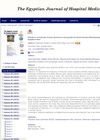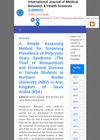 11 citations
,
March 2021 in “Reproductive Biology and Endocrinology”
11 citations
,
March 2021 in “Reproductive Biology and Endocrinology” Polycystic Ovary Syndrome (PCOS) symptoms vary globally, with bloating, high cholesterol, and glucose levels being common; the current diagnostic criteria may need refining.
 October 2020 in “The Egyptian Journal of Hospital Medicine”
October 2020 in “The Egyptian Journal of Hospital Medicine” More than half of the young women checked had PCOS, which was linked to inactive lifestyles and poor diets.
 January 2020 in “International Journal of Medical Research and Health Sciences”
January 2020 in “International Journal of Medical Research and Health Sciences” Many female students at Northern Border University in Saudi Arabia may have Polycystic ovary syndrome (PCOS) and related emotional distress, so those at risk should get further tests and treatment.
3 citations
,
June 2019 in “Clinical nursing studies” Polycystic ovary syndrome (PCOS) lowers women's quality of life, especially mentally and socially, but nursing guidelines can improve their understanding of the condition.
 4 citations
,
September 2018 in “International journal of research - granthaalayah”
4 citations
,
September 2018 in “International journal of research - granthaalayah” Most female students at Qassim University know about PCOS, but there are still misunderstandings about it.
 12 citations
,
December 2017 in “Gynecological Endocrinology”
12 citations
,
December 2017 in “Gynecological Endocrinology” About 5% of Thai university girls aged 17-19 have polycystic ovary syndrome, with moderate acne being a strong risk factor.
 22 citations
,
October 2017 in “Australian & New Zealand Journal of Obstetrics & Gynaecology”
22 citations
,
October 2017 in “Australian & New Zealand Journal of Obstetrics & Gynaecology” Many young Australian women think they have PCOS, but only a few are diagnosed correctly, causing unnecessary worry.
 January 2015 in “International journal of reproduction, contraception, obstetrics and gynecology”
January 2015 in “International journal of reproduction, contraception, obstetrics and gynecology” Women with PCOS often have irregular periods, a higher chance of infertility and miscarriages, and may improve fertility with lifestyle changes and treatment.






